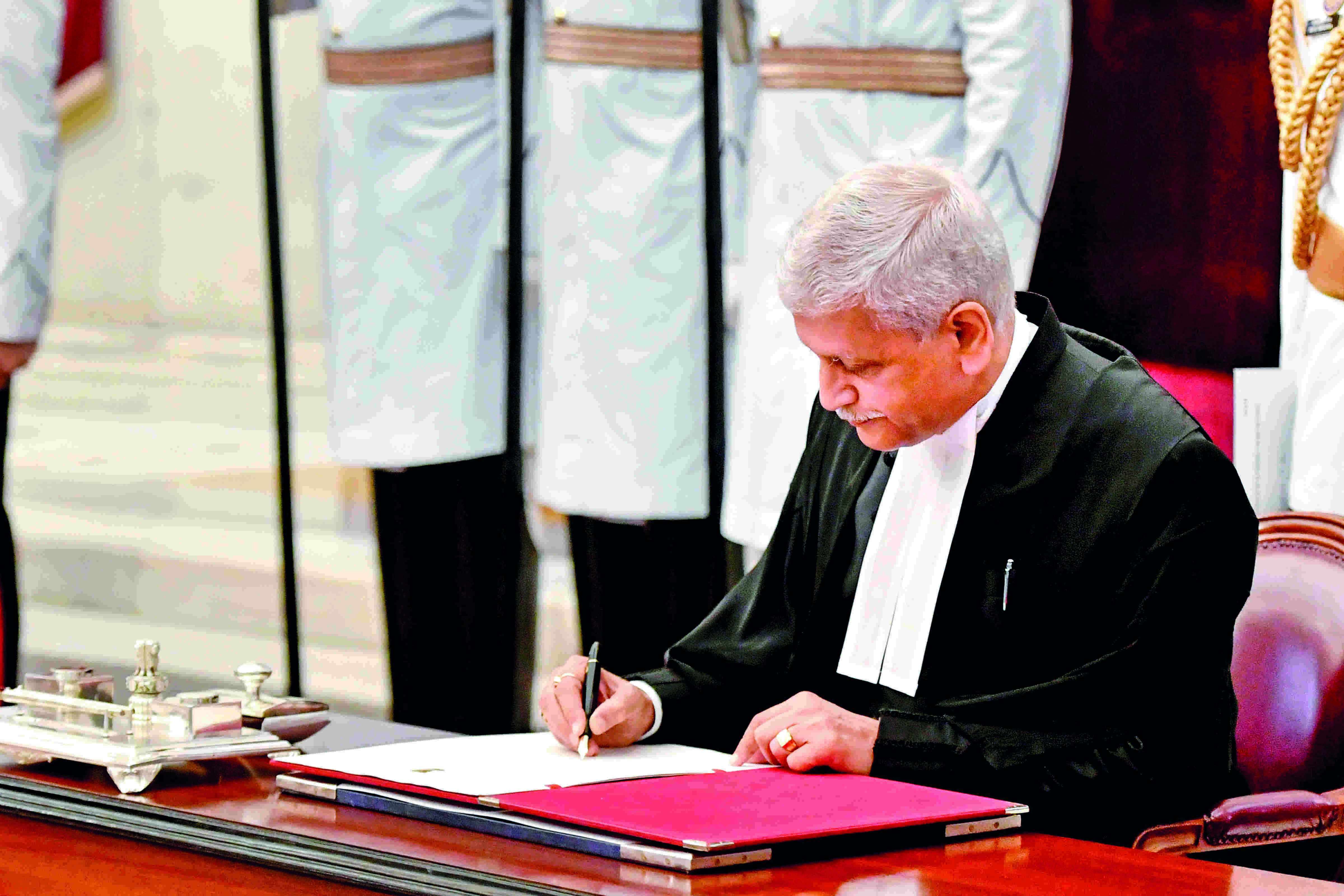Justice UU Lalit sworn in as 49th CJI

New Delhi: Justice Uday Umesh Lalit, the senior-most judge in the Supreme Court, was on Saturday sworn in as the 49th Chief Justice of India (CJI).
President Droupadi Murmu administered the oath to Justice Lalit, who is the second CJI to be directly elevated to the apex court from the Bar, during a brief ceremony at the Rashtrapati Bhavan.
As the CJI, Justice Lalit will have a short tenure of 74 days and demit office on November 8 on attaining the age of 65 years. Justice D Y Chandrachud, the senior-most judge after Justice Lalit, is next in line to be the country's top judge.
Justice S M Sikri, who became the 13th CJI in January 1971, was the first lawyer to be elevated directly to the top court in March 1964.
"Congratulations," President Murmu said after Justice Lalit signed the register of oath.
Vice-President Jagdeep Dhankhar, Prime Minister Narendra Modi, former President Ram Nath Kovind, former Vice-President M Venkaiah Naidu and Union ministers, including Kiren Rijiju, who holds the Law and Justice portfolio, were present at the ceremony. Justice Lalit's predecessor, Justice N V Ramana, was also present.
After he was sworn in, Justice Lalit sought the blessings of his 90-year-old father Umesh Ranganath Lalit, a former judge of the Bombay High Court in 1975, and other family elders by touching their feet.
Justice Lalit, who was a senior advocate before being appointed a judge of the apex court on August 13, 2014, has been part of several landmark verdicts, including the one which held the practice of divorce through instant 'triple talaq' among Muslims illegal and unconstitutional.
While the then Chief Justice J S Khehar and Justice S Abdul Nazeer were in favour of putting on hold the judgment for six months and asking the government to come out with a law to that effect, Justices Kurian Joseph, R F Nariman, and Lalit held the practice as violative of the Constitution. Justices Khehar, Joseph and Nariman have since retired.
Recently, a bench headed by Justice Lalit had assembled at 9.30 am, an hour earlier than the usual start of working hours of the apex court, to hear matters.
"In my view, ideally we should sit at 9 in the morning. I have always said that if our children can go to school at 7 in the morning, then why can't we come at 9 am," Justice Lalit had observed.
On August 22, a bench headed by Justice Lalit fixed the Amrapali homebuyers matter for hearing from 10.30 am to 1 pm on September 3 (Saturday), which is not a working day in the top court.
Quashing the controversial 'skin-to-skin' judgments of the Bombay High Court in two cases under the POCSO Act, a bench headed by Justice Lalit had said the high court erred in holding that there was no offence since there was no direct 'skin-to-skin' contact with sexual intent.
On the roadmap for the future, Justice Lalit has made his intentions known to work on three key areas during his short tenure including the listing of cases and mentioning of urgent matters in the Supreme Court.
On Friday, he had highlighted the three areas, saying he would strive hard to ensure that at least one Constitution bench of the top court functioned throughout the year.
Speaking at a function organised by the Supreme Court Bar Association (SCBA) to bid farewell to Justice Ramana, Justice Lalit said he has always believed that the role of the top court is to lay down law with clarity and the best possible way to do it is to have larger benches as early as possible so that the issues get clarified immediately.
"So, we will strive hard to say that yes, we will always have at least one Constitution bench functioning all throughout the year."
Justice Lalit said one of the areas in which he intends to work is about the listing of cases before the Constitution benches and matters which are specially referred to three-judge benches.
During Justice Lalit's tenure as the CJI, several important cases, including Constitution bench matters, are likely to come up for adjudication before the apex court.
The top court had recently notified that 25 five-judge Constitution bench matters would be listed from August 29.
Among the important five-judge bench matters which have been listed is a plea challenging the Constitution (One Hundred and Third Amendment) Act, 2019 which provided reservation to Economically Weaker Sections (EWS), the challenge to the WhatsApp
privacy policy, and the issue of parliamentarians or legislators claiming immunity from criminal prosecution for taking a bribe to give a speech or a vote in the House.
Born on November 9, 1957, Justice Lalit enrolled as an advocate in June 1983 and practised in the Bombay High Court till December 1985.
He shifted his practice to Delhi in January 1986, and in April 2004, he was designated as a senior advocate by the apex court.
He was appointed a special public prosecutor for the CBI to conduct the trial in the 2G spectrum allocation case.
In January 2019, he recused himself from hearing the politically-sensitive Ram Janmabhoomi-Babri Masjid land title dispute in Ayodhya. Justice Lalit will be the sixth CJI to have a tenure of less than 100 days.
Justice Kamal Narain Singh, who was the CJI between November 25, 1991 and December 12, 1991, had a tenure of 18 days.
While Justice S Rajendra Babu had a tenure of 30 days between May 2 and May 31, 2004, Justice J C Shah was the CJI for 36 days between December 17, 1970 and January 21, 1971.
Justice G B Patnaik had a 41-day tenure from November 8 to December 18, 2002 and Justice L M Sharma had a tenure of 86 days between November 18, 1992 and February 11, 1993.
with agency inputs



